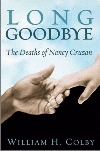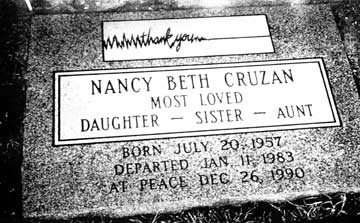|
Seven years
later the
Court faced right to die issues again in two cases involving challenges
to laws criminalizing physician-assisted suicide. The lower
courts
in each case, one involving a Washington state law and another a New
York
statute, found the laws unconstiutional--at least as applied (the 9th
Circuit
decision rested on due process right-to-privacy grounds, the 2nd
Circuit
decision on equal protection grounds.) The Supreme Court reversed in
both
cases, finding the laws to be constiutional. Although the Court
interpreted Cruzan
as recognizing a right to refuse medical treatment, the Court found no
constitutional basis for a right to assisted suicide. Three
justices
in concurring opinions (O'Connor, Breyer, Stevens) indicated that they
might be willing to uphold "more particularized challenges" to such
laws,
such as--for example--an as applied challenge to a state's
refusal
to assist a terminally ill patient in severe pain from ending his or
her
life. In 2006, in Gonzales v Oregon, the Court
decided another right-to-die case, although this one primarily on
administrative law grounds, not constitutional grounds. Voting 6
to 3, the Court ruled that Attorney General Ashcroft exceeded his
powers under the Controlled Substances Act when he threatened
prosecution against Oregon doctors prescribing lethal drugs under that
state's Death with Dignity Act. Writing for the majority, Justice
Kennedy concluded that regulation of medical practices was primarily a
job for the states and that Ashcroft failed to recognize "the
background principles of our federal system."
|
Cruzan v. Missouri Dep't. of Health (1990) Washington v. Glucksberg (1997)
Questions 2. In what sense could Nancy Cruzan even be considered a "person"? What are the essential attributes of a person? 3. Since Nancy could feel neither embarrassment or pain, isn't it really only the empathetic interests of the family at stake? 4. What if Missouri defined Nancy as dead and ordered her feeding discontinued against the wishes of her parents? Would they have any constitutional claim? 5. Was Missouri using Nancy as a symbol? As a symbol for what? 6. Should it matter whther the decision involved was to discontinue feeding rather than extraordinary treament such as a ventilator? 7. Could Missouri have prevented the Cruzans from taking Nancy to another state which would allow their wishes to be carried out? 8. If there was a right to assisted suicide, as the 9th Circuit found, why should the right be limited to terminally ill and competent adults? Why would persons in great pain, or who are severely depressed, also have such a right? 9. Does the distinction between passive euthanasia (withdrawl of feeding tubes, for example) and active euthanasia (administration of lethal drugs, for example) make sense to you? 10. What state interests supporting laws against physician-assisted suicide do you think are the strongest?  Attorney Bill Colby (left) with the family of Nancy Cruzan Further Reading |



